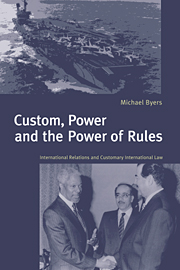Book contents
- Frontmatter
- Contents
- Foreword by James Crawford
- Preface
- Acknowledgments
- Table of cases
- Table of treaties
- List of abbreviations
- Part 1 An interdisciplinary perspective
- Part 2 International law and the application of power
- Part 3 The process of customary international law
- 8 Fundamental problems of customary international law
- 9 International relations and the process of customary international law
- 10 Related issues
- 11 Conclusions
- Bibliography
- Index
8 - Fundamental problems of customary international law
Published online by Cambridge University Press: 22 September 2009
- Frontmatter
- Contents
- Foreword by James Crawford
- Preface
- Acknowledgments
- Table of cases
- Table of treaties
- List of abbreviations
- Part 1 An interdisciplinary perspective
- Part 2 International law and the application of power
- Part 3 The process of customary international law
- 8 Fundamental problems of customary international law
- 9 International relations and the process of customary international law
- 10 Related issues
- 11 Conclusions
- Bibliography
- Index
Summary
Numerous attempts have been made to provide compelling answers to the many theoretical problems associated with customary international law. The number and diversity of these attempts and growing interest in the subject are indications of how the discipline of international law requires a more convincing rationalisation of the customary process as a whole.
Earlier in this book it was suggested that the process of customary international law involves the transformation of power into obligation in the form of customary rules. Power, by definition, is relational in character, and at least two aspects of this relational character are involved in the customary process. First, there are the relative abilities of different States to control or influence directly how other States behave, and, secondly, there are the relative abilities of power and legal obligation to affect each other.
It will become clear during the next three chapters of this book that many of the theoretical problems associated with the customary process are linked to the relational character of power. It is therefore somewhat surprising that so few international lawyers have considered directly the role played by power in the process of customary international law. As has already been explained, most of them have skirted the issue, sometimes acknowledging the importance of power but rarely examining how power affects the development, maintenance and change of different customary rules.
The discipline of international relations is an obvious source of ideas and insights for a study of power in the process of customary international law.
- Type
- Chapter
- Information
- Custom, Power and the Power of RulesInternational Relations and Customary International Law, pp. 129 - 146Publisher: Cambridge University PressPrint publication year: 1999



